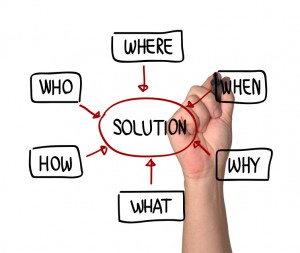Questions act as the critical trigger to bigger thinking. For example, in the workplace, if you try to do something differently, you may be met with the response, ‘That’s not how we do things here.’ The big thinker would wonder why not and would not hesitate to ask ‘What stops you?’ This is a powerful question.
Cristina Bianchi / Maureen Steele writing in Coaching for Innovation
Questions lie at the heart of coaching and when you want to coach for innovation, you need to be asking powerful questions to stimulate connections that have not been made before. It is then much more likely that the outcome is change and a different way of doing things, whether this change is gradual and progressive or radical and revolutionary.
Finding the right words at the right time to ask the perfect question that focuses the attention of the listener where it most needs to be is a tough call. This is often because neither the person who is asking the question, nor the person who is being asked, realises consciously that the question prompts the listener in a certain direction and will generally predetermine the answer. In other words, you do really get what you ask for.
Characteristics of powerful questions
Powerful questions are well formulated – the choice of words is critical.
- Incorporate into your question the key words used by the other person to demonstrate that you have listened well and that you value what has just been said.
- Use short and simple sentences that provide clarity about what you are asking.
- Have one clear ask rather than asking multiple questions at the same time.
- Out of the many interrogative words and phrases available to you, (e.g. who, what, how, where, when, and why), select the most appropriate for the purpose.
Powerful questions are timely – timing is crucial and multi–dimensional.
- Let the other person finish the sentence before placing your question.
- Pick up on the kind of important information in what has been said that makes you want to explore more.
- Develop your skill in knowing which is the right moment to act on this information.
- Understand when to ask a question that maintains forward momentum and when to ask a question that creates space for reflection.
- Match the pace, rhythm and energy of the other person so they feel at ease.
- Sometimes, consciously change the pace, rhythm and energy displayed by the other person so they shift focus when this is needed.
- Use the element of surprise and ask something unexpected that creates a challenge.
Powerful questions are relevant – a question is relevant when it is related to the context.
- The person asking feels there is a good reason to ask the question.
- It stimulates a response that serves the purpose.
- It connects and refers to various elements of the dialogue.
- It resonates with the person being asked in a way that makes sense to them even if it is challenging.

